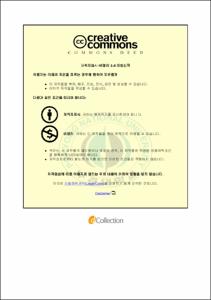영 역할놀이가 초등학생의 의사소통능력향상과 학습태도에 미치는 영향
- Abstract
- Effects of Role Plays on Elementary School Children’s
Communicative Competence and Attitude
Towards English Studies
Yu-Mi Kim
Graduate School of Education
Pukyong National University
Abstract
The goal of this study is to investigate the effects of role plays on elementary school children’s communicative competence and attitude towards English studies. To achieve the goal of the study, the effects of role plays were measured according to the participants’ English abilities (listening, speaking, reading and writing) and their attitude toward English studies through the questionnaire surveys. A total of 67 5th grade children from a local elementary school in Busan took part in the study. The same prior English ability test and study attitude survey were used to examine the effects of role play activities. After the treatment, the data measuring their communicative competence and study attitude were analyzed statistically with a mean comparison and t-test using the SPSS.
Based on the results of the data analysis, the findings of the current study are as follows: First, the mean of the post-test scores were higher than the pretest scores in children’s listening, speaking, reading, and writing, especially within the range of statistical significance. The speaking test scores were improved considerably among the four languages skills. Consequently, that seems to reflect on the fact that role play was one of the decisive factors in improving the communicative competence in elementary school children.
Second, role plays seem to have affected children’s attitude toward their English studies greatly and a statistical significance has been demonstrated across the pre-test and post-test. Thus, it can be said that the effects of role plays in improving the children’s readiness to learn, attention ability, interest and confidence might have been verified. Based on the results listed above, the following suggestions can be made: First, it is necessary that teachers restructure the textbook continuously to give various role play topics to their students. Teachers should think of creating various role play situations even though the topic is the same. It is important to note that students’ activities should not be the typical, repetitive nature of role plays, but instead should be presentations of their own stories.
Second, though the result of role plays was positive, effects of role plays may not influence all the students in a class. Thus, it is necessary for teachers not to push introverted students and underachievers who might feel burdened by having to do role plays in front of their peers by engaging in the dialogues, making themselves comfortable where making mistakes or errors are allowed.
Third, to do more effective role plays, teachers should share their teaching information with colleagues and try to improve their teaching skills consistently. At the same time, it is necessary for their students to be exposed to English as much as possible and have as many opportunities to say English as possible in order to improve their communicative competence in English. To achieve this, teachers’ on-going effort for their professional development might be needed.
- Issued Date
- 2014
- Awarded Date
- 2014. 8
- Type
- Dissertation
- Publisher
- 부경대학교
- Affiliation
- 교육대학원
- Department
- 교육대학원 초등영어교육전공
- Advisor
- 박매란
- Table Of Contents
- 목차
ABSTRACT
Ⅰ. 서론 1
1.1 연구의 필요성 및 목적 1
1.2 연구 과제 2
1.3 연구의 제한점 3
Ⅱ. 이론적 배경 4
2.1 역할놀이와 영어교육 4
2.2 역할놀이와 의사소통능력 10
2.3 선행 연구 13
Ⅲ. 연구 방법 16
3.1 연구대상 및 기간 16
3.2 연구 도구 17
Ⅳ. 분석 결과 및 논의 30
4.1 역할놀이가 의사소통능력에 미치는 영향 30
4.2 역할놀이가 학습태도에 미치는 영향 32
Ⅴ. 결론 및 제언 37
5.1 결론 37
5.2 제언 38
참고문헌 40
부록 43
- Degree
- Master
- Files in This Item:
-
-
Download
 영 역할놀이가 초등학생의 의사소통능력향상과 학습태도에 미치는 영향.pdf
기타 데이터 / 2.93 MB / Adobe PDF
영 역할놀이가 초등학생의 의사소통능력향상과 학습태도에 미치는 영향.pdf
기타 데이터 / 2.93 MB / Adobe PDF
-
Items in Repository are protected by copyright, with all rights reserved, unless otherwise indicated.